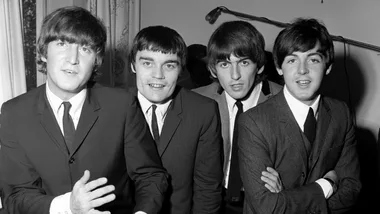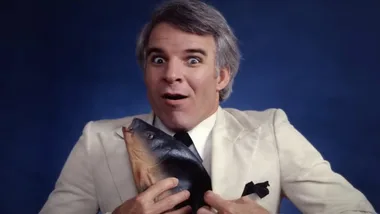Most artists spruiking a tour will tell you they love Australia, but Eric Idle truly means it. This pillar of Monty Python, creator of the crucifixion classic, Always Look on the Bright Side of Life, and mastermind of the Tony-Award-winning musical Spamalot, has spent so much time with Aussies that he could almost be one.
His first wife (actress Lyn Ashley) was Australian, his son (Carey) lives on the Sunshine Coast, and his first trip here helped him to dust himself off and get back on his feet when life seemed irretrievably bleak. But Eric’s connection to Australia dates back further still — to his days at the University of Cambridge.
“I loved Australians,” he tells The Weekly. “Most of the Australians I knew were a little bit older than me … I liked them because they were funny and witty and knew about living. They’d seen the world a bit. They’d come a long way to be at university in England, and they had a lot to say.

“My first wife’s mother was an Australian actress called Madge Ryan. [Both Madge and Lyn were living in London but hailed from Toowoomba.] Madge would take us to see Barry Humphries at the Fortune Theatre, so I got to know him quite early on. He wasn’t a superstar or a dame. He was a very witty and wonderful man. I loved him all my life … I was lucky to know him. Clive James was a good friend too.”
Through Clive, Eric met Germaine Greer, and together they flew an early flag for feminism. Eric had long thought it was “ridiculous” that women were not permitted to join the Cambridge Footlights comedy society. Then, in his final year, he became its president and “being a lower-middle class lad in a position of power, I exercised it,” he chuckles. “I singlehandedly altered the rules to permit women to join. All the dons were very upset. It was before the colleges allowed women, so it was kind of early, but it was inevitable.
“One of the first women to be made a member was Germaine Greer, who came through the door one day with Clive James. You had to audition to be in the Footlights, and she did a thing called ‘The Nun Strip’, which was hilarious. I liked her a lot. And after that, it was just much more fun.”
Eric had arrived at Cambridge, bright, inquisitive and with his sense of the ridiculous honed by a tough childhood.
He was born in 1943 in the north of England. His father, an RAF gunner, survived the war but was killed in a road accident while hitchhiking home for Christmas. His mother, devastated, plunged into deep depression and sent her two-year-old son to be raised by a relative, whom he called “Gran”, and her husband, a dentist he knew as “Pop”.
“The things I learned from them were interesting,” he says. “I learned a love of the circus. They took me to see variety shows. I saw Morecambe and Wise and all these people at the age of five. You know, they were very sweet and loving, but also eye-opening. And I was very fortunate to have them.

“Once, Gran took me to three movies in a day. Who does that? I loved it. I think one was The Mountain [starring Spencer Tracy and Robert Wagner], one was a Marx Brothers movie, and I don’t remember what the other one was. But, I thought, this is great.”
At seven, however, the entertainment and affection came to an end. Eric was deposited in a grim boarding school in Wolverhampton where many of the boys had lost parents in the war. “I was there for 12 years,” he says. “You get less for murder.” But at school, he learnt to use humour as a shield.
“I realised that it’s much harder for bullies to hit you when they’re laughing,” he tells The Weekly. He also “got into puppetry and writing little shows and putting on funny voices. I liked it because you’re hidden as a puppeteer.
“Comedy, for me, was a big release. I was still at school when I went to see Beyond the Fringe [a live revue by Peter Cook, Dudley Moore, Alan Bennett and Jonathan Miller], and I learned that you could laugh at things like the royal family and the army and religion. I went back to school and I felt liberated … After that, I just wanted to be a comedian, to be funny.”
Eric also discovered rock and roll. “Elvis Presley came into our lives on television,” he remembers, “and we thought: ‘What on earth? We love this!’ I wanted a guitar from then on, and I got one. We also loved Buddy Holly [and later] we were into the Modern Jazz Quartet and Miles Davis.
“Then the Beatles came along when I was at college and made pop music interesting again — exciting and of the moment and about the culture. They changed Cambridge when I was there — completely changed it. They changed the world.”

Looking back, Eric remembers those years as a renaissance.
“We’d come out of the war,” he explains. “We’d had rationing and poverty, the houses had been bombed and the streets were not working. The generation that came out of art school then became the rock and rollers … and it was very interesting and exciting to be part of that renaissance.”
UK universities and art colleges were also hatching a new generation of comedians, including Eric’s Cambridge Footlights fellows, Tim Brooke-Taylor, Bill Oddie, and Graeme Garden, who went on to create The Goodies, and Jonathan Lynn, co-writer of the classic Yes Minister and Yes, Prime Minister BBC series.
Most irreverent and absurdist of all were the Monty Python crew: Graham Chapman, John Cleese, and Eric (all from Cambridge); Terry Jones and Michael Palin (from Oxford); and Terry Gilliam, whom John Cleese had met in New York and who created the Python’s surreal, visionary graphics.
The first episode of Monty Python’s Flying Circus aired on BBC One at 10.55pm on October 5, 1969. The TV sketch show slowly built a cult and then a mainstream following, first in the UK, then in Canada and Australia, and finally in the United States. Sketches like Dead Parrot, The Lumberjack Song, Bruces’ Philosophers Song, Nudge Nudge and Spam were simultaneously sophisticated and ridiculous and became calling cards in a new post-psychedelic/pre-punk counterculture.

As the Pythons stretched their comedic vision into feature films (with And Now for Something Completely Different, Monty Python and the Holy Grail and Life of Brian), they became bona fide superstars. And Eric joined the jet-set.
“The party went on everywhere,” he recalls in his memoir, Always Look on the Bright Side of Life. “One minute we were in Studio 54 in New York, the next on Dodi Fayed’s yacht in Monte Carlo.” He hung around with David Bowie and the Rolling Stones. He became close friends with George Harrison, who mortgaged his house to fund Life of Brian. He even dined on occasion with the future King.
“We would all go up to Billy Connolly and Pamela Stephenson’s home in Candacraig,” Eric recalls. He used to call it ‘Pamelot’. “It wasn’t far from Balmoral. And there might be me and Robin Williams and Steve Martin and Eddie Izzard. And then [King] Charles would call up Billy and say, ‘I hear you’ve got some very funny people over. Can I come to dinner?’ So he’d come, and the comedians would just let loose and he would laugh and laugh because, if you have to spend all day with people calling you sir and creeping around, it’s really refreshing to have people just treat you as a human being. I think it was good therapy for him.
“At one point, he said, ‘Oh, you should be my jester’. And I said, ‘Why would I want a f**king awful job like that?’ And he laughed. He laughed because that’s what a jester’s job is — to remind the monarch that they’re just human.
“I think it’s a terrible role to be in — royalty. I’m against it on the grounds that it’s very bad for the people involved in it … It’s a sort of child abuse, and it’s very hard to escape — hard to escape into normality.”

One of the side-effects of fame was its attractiveness to women, and while Eric found a girl in every port, Lyn largely remained at home with Carey. Eventually, their marriage crumbled and Eric spiralled into depression.
His friend, George, was a godsend, inviting him for weekends at his neo-Gothic country mansion, Friar Park, where Eric filmed the video for George’s song, Crackerbox Palace. “George saved me,” Eric says, and he also made him laugh.
To lift himself out of depression, Eric took a job making a TV commercial in Australia.
“My marriage was breaking up, and I was cold and miserable in England,” he explains. “I said, ‘Count me in’.”
When he told George he was going, the Hindu-practising Beatle asked if he’d be flying over India. Eric said, “Yeah, I guess so.” So George gave him a package with a note that read, “Do not open until you’re over India.”
“I thought, oh my God, this will be the meaning of life, here we go,” Eric chuckles. “So I waited until I was over India, about ten hours in, and I got it out. It was like peacock feathers and all this beautiful wrapping around this tiny little box. And I opened it up, and in it, in George’s handwriting, was a note that said, ‘Shag a sheila for me’.” Which Eric did.

Not long after, though, at 33 years old — too late to save his first marriage but just in time to meet the love of his life — Eric had an epiphany. He woke one morning on a beach in Barbados with sandy knees and no idea of the name of the woman he was with.
“I realised then that I couldn’t shag every woman in the world,” he wrote in his memoir. “‘This has got to stop’, I said to myself … And stop it I did.”
The following year, “after a decent interval of abstinence”, he met a smart and striking model, Tania Kosevich, and his life pivoted again.
“It was the very next time I went to New York,” he recalls. “This woman asked me to dance, and I fell in love with her instantly. I was ready. I said, ‘I’m never going to leave you’, and that was 47 years ago.”
Eric and Tania live in Los Angeles and have a daughter, Lily, who is a writer, artist, photographer and mental health advocate, having navigated diagnoses of bipolar and ADHD herself.
“I wasn’t a very good dad in my first marriage,” Eric admits. “I was a bit absentee. I mean, I came to America and I was working and away a lot. Carey has forgiven me for that.
“But the second time around, I said, ‘I’m going to be here for this child. I’m going to drive her to school and I’m not going to be away. She’s had difficulties in her life and, you know, I try to be with her. I try to help her through. I think you have to keep a bond going.”

Eric says he believes he has that bond with both his kids now. “And I love them for that.”
Five years ago, the family was drawn closer together when Eric was diagnosed with pancreatic cancer — the very cancer that a doctor friend had once told him was the fastest way to kill off a character in a script he was working on. Unlike Eric’s ill-fated protagonist, his own cancer was detected unusually early and he made a complete recovery.
At the time, he called his cancer Kenny, because it made it seem “less scary, more manageable”, and his surgeon operated in a purple paisley dinner jacket. But the rest of the experience was less Python-esque, and he’s grateful that, as in the famous Monty Python sketch from The Holy Grail, he’s “not dead yet”.
“Everything in life is a benefit from this point forward,” he explains. “I’m really lucky to be here. So I don’t take things so seriously, don’t get so easily upset by people. That’s how I think of it. And I try to help the pancreatic cancer organisations so I can pass it on. We are fighting this, and we’re beginning to win.”
Always Look on the Bright Side of Life has become the most-played song at UK funerals. The crew of the sinking HMS Sheffield sang it during the Falklands War and by Eric himself at the closing ceremony for the London Olympics, dressed as a human cannonball and surrounded by bhangra dancers, skating nuns and high-kicking Roman centurions. He is not sure what song he would like played at his own funeral, but he hopes there will be fireworks and humour. “I think we all need a good laugh at a funeral,” he says, “because, you know, laughter and tears are very close.”

There might be a little of both on Eric’s Australian tour (Always Look on the Bright Side of Life, Live!) as he pays tribute to two dear friends who were a loss not just to Eric but to all of us. There will be a song for Robin Williams — “my favourite comedian and a very good pal also” — and another for George.
It’s been 23 years since the Beatle died of cancer, but Eric insists he still misses him.
“Of course I do,” he says. “I’ve just recorded a song called I Miss You, George, and we’re playing it in the show in Australia. I miss him every day. He was a wonderful person and a big influence, and he took me by the hand and led me through a dark time in my life, and that was so kind of him. I appreciate that to this day.”
Eric Idle’s Always Look on the Bright Side of Life, Live! plays Australasia from October 23. Visit bohmpresents.com



